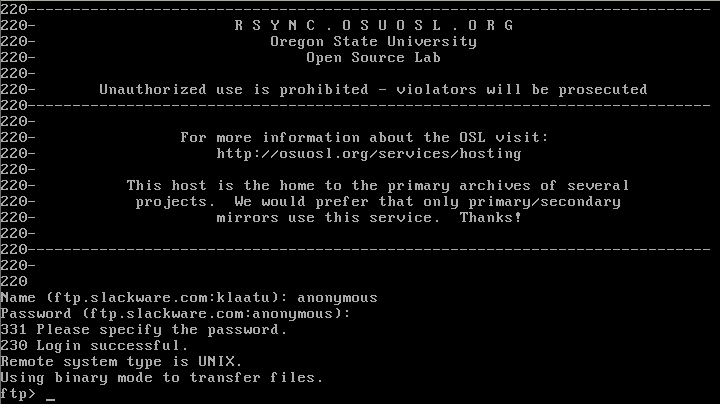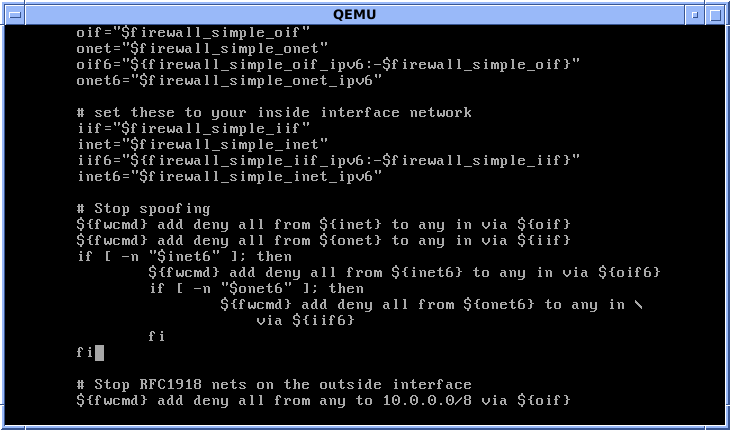|
Swaret
Swaret was a program for the Slackware Linux distribution A Linux distribution (often abbreviated as distro) is an operating system made from a software collection that includes the Linux kernel and, often, a package management system. Linux users usually obtain their operating system by downloading on ... that resolves dependencies. Swaret stands for SlackWARE Tool. Features *True library dependency resolution *Rollback capability *Logging *3rd party software repository support *Support for http, ftp, rsync, and local filesystems History The program was created by Luc Cottyn, and was originally called "autopkg". However, because of a conflict with another project of the same name it was renamed to swaret. It has no active maintainer. References External links * {{Linux package management systems Slackware Free package management systems Linux package management-related software Linux-only free software ... [...More Info...] [...Related Items...] OR: [Wikipedia] [Google] [Baidu] |
Slackware
Slackware is a Linux distribution created by Patrick Volkerding in 1993. Originally based on Softlanding Linux System, Slackware has been the basis for many other Linux distributions, most notably the first versions of SUSE Linux distributions, and is the oldest distribution that is still maintained. Slackware aims for design stability and simplicity and to be the most "Unix-like" Linux distribution. It makes as few modifications as possible to software packages from upstream and tries not to anticipate use cases or preclude user decisions. In contrast to most modern Linux distributions, Slackware provides no graphical installation procedure and no automatic dependency resolution of software packages. It uses plain text files and only a small set of shell scripts for configuration and administration. Without further modification it boots into a command-line interface environment. Because of its many conservative and simplistic features, Slackware is often considered to be mo ... [...More Info...] [...Related Items...] OR: [Wikipedia] [Google] [Baidu] |
Shell Script
A shell script is a computer program designed to be run by a Unix shell, a command-line interpreter. The various dialects of shell scripts are considered to be scripting languages. Typical operations performed by shell scripts include file manipulation, program execution, and printing text. A script which sets up the environment, runs the program, and does any necessary cleanup or logging, is called a wrapper. The term is also used more generally to mean the automated mode of running an operating system shell; each operating system uses a particular name for these functions including batch files (MSDos-Win95 stream, OS/2), command procedures (VMS), and shell scripts (Windows NT stream and third-party derivatives like 4NT—article is at cmd.exe), and mainframe operating systems are associated with a number of terms. Shells commonly present in Unix and Unix-like systems include the Korn shell, the Bourne shell, and GNU Bash. While a Unix operating system may have a different ... [...More Info...] [...Related Items...] OR: [Wikipedia] [Google] [Baidu] |
Linux
Linux ( or ) is a family of open-source Unix-like operating systems based on the Linux kernel, an operating system kernel first released on September 17, 1991, by Linus Torvalds. Linux is typically packaged as a Linux distribution, which includes the kernel and supporting system software and libraries, many of which are provided by the GNU Project. Many Linux distributions use the word "Linux" in their name, but the Free Software Foundation uses the name "GNU/Linux" to emphasize the importance of GNU software, causing some controversy. Popular Linux distributions include Debian, Fedora Linux, and Ubuntu, the latter of which itself consists of many different distributions and modifications, including Lubuntu and Xubuntu. Commercial distributions include Red Hat Enterprise Linux and SUSE Linux Enterprise. Desktop Linux distributions include a windowing system such as X11 or Wayland, and a desktop environment such as GNOME or KDE Plasma. Distributions intended for ... [...More Info...] [...Related Items...] OR: [Wikipedia] [Google] [Baidu] |
Package Management Systems
A package manager or package-management system is a collection of software tools that automates the process of installing, upgrading, configuring, and removing computer programs for a computer in a consistent manner. A package manager deals with package format, ''packages'', distributions of software and data in archive files. Packages contain metadata, such as the software's name, description of its purpose, version number, vendor, checksum (preferably a cryptographic hash function), and a list of coupling (computer programming), dependencies necessary for the software to run properly. Upon installation, metadata is stored in a local package database. Package managers typically maintain a database of software dependencies and version information to prevent software mismatches and missing prerequisites. They work closely with software repository, software repositories, binary repository managers, and app stores. Package managers are designed to eliminate the need for manual ins ... [...More Info...] [...Related Items...] OR: [Wikipedia] [Google] [Baidu] |
GNU General Public License
The GNU General Public License (GNU GPL or simply GPL) is a series of widely used free software licenses that guarantee end user In product development, an end user (sometimes end-user) is a person who ultimately uses or is intended to ultimately use a product. The end user stands in contrast to users who support or maintain the product, such as sysops, system administrat ...s the Four Freedoms (Free software), four freedoms to run, study, share, and modify the software. The license was the first copyleft for general use and was originally written by the founder of the Free Software Foundation (FSF), Richard Stallman, for the GNU Project. The license grants the recipients of a computer program the rights of the Free Software Definition. These GPL series are all copyleft licenses, which means that any derivative work must be distributed under the same or equivalent license terms. It is more restrictive than the GNU Lesser General Public License, Lesser General Public License ... [...More Info...] [...Related Items...] OR: [Wikipedia] [Google] [Baidu] |
Linux Distribution
A Linux distribution (often abbreviated as distro) is an operating system made from a software collection that includes the Linux kernel and, often, a package management system. Linux users usually obtain their operating system by downloading one of the Linux distributions, which are available for a wide variety of systems ranging from embedded devices (for example, OpenWrt) and personal computers (for example, Linux Mint) to powerful supercomputers (for example, Rocks Cluster Distribution). A typical Linux distribution comprises a Linux kernel, GNU tools and libraries, additional software, documentation, a window system (the most common being the X Window System, or, more recently, Wayland), a window manager, and a desktop environment. Most of the included software is free and open-source software made available both as compiled binaries and in source code form, allowing modifications to the original software. Usually, Linux distributions optionally include some propri ... [...More Info...] [...Related Items...] OR: [Wikipedia] [Google] [Baidu] |
Dependency (computer Science)
In software engineering, coupling is the degree of interdependence between software modules; a measure of how closely connected two routines or modules are; the strength of the relationships between modules. Coupling is usually contrasted with cohesion. Low coupling often correlates with high cohesion, and vice versa. Low coupling is often thought to be a sign of a well-structured computer system and a good design, and when combined with high cohesion, supports the general goals of high readability and maintainability. History The software quality metrics of coupling and cohesion were invented by Larry Constantine in the late 1960s as part of a structured design, based on characteristics of “good” programming practices that reduced maintenance and modification costs. Structured design, including cohesion and coupling, were published in the article ''Stevens, Myers & Constantine'' (1974) and the book ''Yourdon & Constantine'' (1979), and the latter subsequently became s ... [...More Info...] [...Related Items...] OR: [Wikipedia] [Google] [Baidu] |
Free Package Management Systems
Free may refer to: Concept * Freedom, having the ability to do something, without having to obey anyone/anything * Freethought, a position that beliefs should be formed only on the basis of logic, reason, and empiricism * Emancipate, to procure political rights, as for a disenfranchised group * Free will, control exercised by rational agents over their actions and decisions * Free of charge, also known as gratis. See Gratis vs libre. Computing * Free (programming), a function that releases dynamically allocated memory for reuse * Free format, a file format which can be used without restrictions * Free software, software usable and distributable with few restrictions and no payment * Freeware, a broader class of software available at no cost Mathematics * Free object ** Free abelian group ** Free algebra ** Free group ** Free module ** Free semigroup * Free variable People * Free (surname) * Free (rapper) (born 1968), or Free Marie, American rapper and medi ... [...More Info...] [...Related Items...] OR: [Wikipedia] [Google] [Baidu] |
Linux Package Management-related Software
Linux ( or ) is a family of open-source Unix-like operating systems based on the Linux kernel, an operating system kernel first released on September 17, 1991, by Linus Torvalds. Linux is typically packaged as a Linux distribution, which includes the kernel and supporting system software and libraries, many of which are provided by the GNU Project. Many Linux distributions use the word "Linux" in their name, but the Free Software Foundation uses the name "GNU/Linux" to emphasize the importance of GNU software, causing some controversy. Popular Linux distributions include Debian, Fedora Linux, and Ubuntu, the latter of which itself consists of many different distributions and modifications, including Lubuntu and Xubuntu. Commercial distributions include Red Hat Enterprise Linux and SUSE Linux Enterprise. Desktop Linux distributions include a windowing system such as X11 or Wayland, and a desktop environment such as GNOME or KDE Plasma. Distributions intended for s ... [...More Info...] [...Related Items...] OR: [Wikipedia] [Google] [Baidu] |


.jpg)


